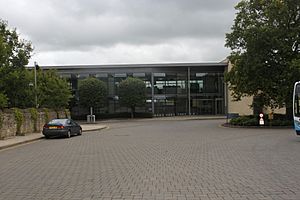Wessex Water facts for kids
 |
|
| Private company | |
| Industry | Water industry |
| Founded | 1973 |
| Headquarters | Bath, Somerset |
|
Key people
|
|
| Products | |
|
Production output
|
|
| Services | Water supply and sewerage services |
| Revenue |
|
|
Operating income
|
|
|
|
|
Number of employees
|
2,547 |
| Parent | YTL Corporation, of Malaysia |
Wessex Water is a company that provides water and sewerage services. It helps bring clean drinking water to homes and businesses. It also takes away wastewater.
The company serves a large area in South West England. This includes cities like Bristol and most of Dorset, Somerset, and Wiltshire. It also covers parts of Gloucestershire and Hampshire. Wessex Water provides water to about 1.3 million people every day. That's a lot of water!
Wessex Water is owned by a company from Malaysia called YTL Corporation. Its main office is located near Bath. The building is modern and designed to save energy.
Contents
How Wessex Water Started
Wessex Water began in 1973. It was one of ten regional water authorities created by a special law. These authorities were later sold to private companies in 1989.
In 1998, an American company bought Wessex Water. Later, in 2002, it was sold to YTL Power International from Malaysia.
Over the years, Wessex Water took over the work of many smaller water companies. These included local water boards and river authorities. Some examples are the Bristol Avon River Authority and the Dorset Water Board.
What Wessex Water Does
Water Sources and Nature
Wessex Water owns and manages several large reservoirs. These are like big lakes that store water. Some of these include Blashford Lakes and Clatworthy Reservoir.
These reservoirs do more than just supply drinking water. Many are also used for fun activities like fishing or boating. They are also important places for nature and wildlife.
Recycling and Renewable Energy
Wessex Water has a special part of its company called GENeco. It started in 2009. GENeco works with sewage treatment plants. These plants clean wastewater from homes and businesses.
GENeco is very clever because it recycles waste. It also creates clean, renewable energy. This energy comes from the waste that is treated. It can even make fertiliser for farms.
In 2010, GENeco showed off something cool called the Bio-Bug. This was a car that ran on bio-gas. This special gas is made from waste treated at sewage plants. Imagine, the waste from just 70 homes could power this car for a whole year!
Later, in 2014, the UK's first bus powered by human and food waste started running. This bus traveled between Bristol and Bath. Since 2019, some buses in Bristol use this special gas. It's all made at GENeco's energy park.
How Wessex Water Performs
Wessex Water works hard to provide good service. In a survey from 2012-2013, customers were very happy with the company.
The company makes sure your drinking water is safe. In 2013, over 99.9% of their drinking water met all safety standards. They also made sure that 100% of their sewage treatment was done correctly.
Wessex Water also tries to stop water from leaking. In 2011-2012 and 2012-2013, they lost 69 million litres of water each day due to leaks. This was less than in previous years, showing they are improving.
The company is also working to reduce its impact on the environment. They have lowered their greenhouse gas emissions. These are gases that can harm the planet. In 2018-2019, their emissions were much lower than in 2011-2012.
Important People at Wessex Water
Ruth Jefferson became the chief executive of Wessex Water in October 2024. She is in charge of the company's daily operations.
Before her, Colin Skellet was the chief executive for a long time, from 1988 to 2024. He is now in charge of all of YTL's activities in the UK. Colin Skellet received an award called the OBE in 2012. This was for his work in business and with a charity called WaterAid. WaterAid helps bring clean water to people around the world.
Francis Yeoh is also an important person. He is a long-serving director of YTL Corporation. He is currently the non-executive chairman of the board at Wessex Water.
 | Leon Lynch |
 | Milton P. Webster |
 | Ferdinand Smith |


